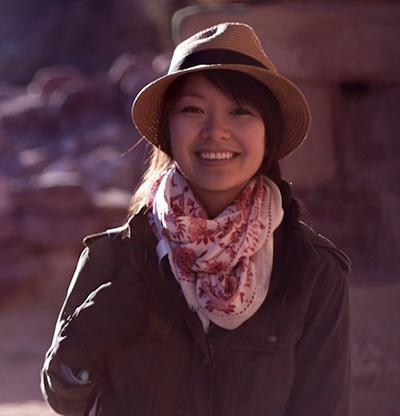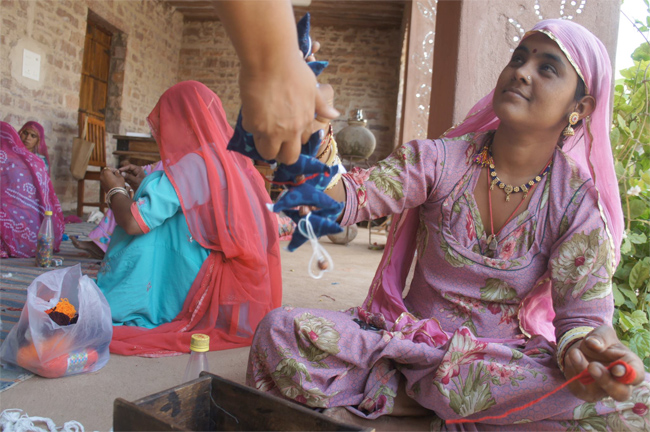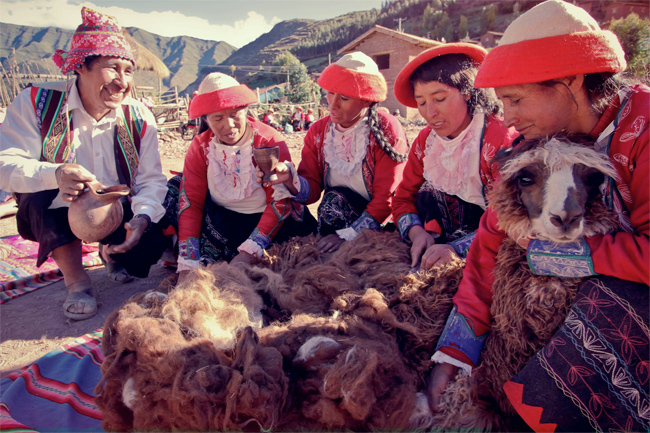 International Women’s Day is March 8. Planeterra, an organization founded by G Adventures to support sustainable social and environmental solutions in destinations travellers love to visit, sees first-hand how the travel and tourism industries benefit women worldwide. For this edition of Friday 5 we talk to Adrienne Lee, Planeterra’s Program Manager.
International Women’s Day is March 8. Planeterra, an organization founded by G Adventures to support sustainable social and environmental solutions in destinations travellers love to visit, sees first-hand how the travel and tourism industries benefit women worldwide. For this edition of Friday 5 we talk to Adrienne Lee, Planeterra’s Program Manager.
1. Women make up the majority of the tourism workforce, and that tourism has almost twice as many women employers as other sectors. In your work with Planeterra, how do you see examples of tourism empowering women?
Lee: We understand that the tourism industry is one of the greatest wealth distributors and job creators in the world, second only to the oil industry. Tourism is also one of few industries that are able to reach some of the most rural and underserved people in the word – many of them women. The tourism industry also utilizes many transferrable skills that individuals, especially women, who may not have benefitted from formalized education, can access to obtain dignified job opportunities and careers.
Planeterra initiates, invests, cultivates and incubates a number of women-run social enterprises, cooperatives, and training programs that give women a hand up, not a hand out in their society. This allows for long-term job training and meaningful careers, creating futures of self-sufficiency, not dependency. This way an individual can take care of themselves and in turn their family and children’s health and education.
We work directly with G Adventures to include these programs into their itineraries, making sure that these enterprises have a long-term customer base and market, creating a more inclusive economy and more cohesive communities.

2. Why do you think women dominate the tourism industry?
Lee: I believe that women dominate the tourism industry because it is one of the only industries where transferrable skills can be translated into real, tangible, and meaningful work. Women and girls are often the first to be excluded from formal education institutes in many places worldwide. Girls are the first to be pulled out of school to help around the house, with only about 30% of girls worldwide making it to secondary school. The tourism industry is able to harness many transferrable skills learned outside of the classroom, and through capacity and vocational training, can create long-term, dignified job opportunities for women in a booming industry.
Women in the developing world often find working in tourism an entry-point into the formal economy, improving their quality of life and access to opportunities as well as to positions of power within their communities.
3. How can Canadians support women when travelling abroad?
Lee: Canadians can research and seek out organizations while travelling that support women. For example, looking for cooperatives that sell handicrafts made by women, or women-owned micro and small enterprises to support be it local restaurants or tours or souvenirs.
There are often non-profit/cooperative/social enterprises around if you are looking out for them. Being a customer is a great way to support women as you’re directly supporting someone’s income and helping them to provide for their own families and improve their quality of life.
Certainly supporting programs like Planeterra with donations is helpful also, as we direct funds towards women’s initiatives in many cases, as that is a strong focus of ours.
And you can look out for tour and travel companies that have initiatives supporting women’s rights, equal opportunities, and education, either through their business model or through supporting non-profits in destinations.

4. What are some of Planeterra’s women-friendly new projects, for example, the Women on Wheels project in New Delhi?
Lee: Women on Wheels is a new project partnership that G Adventures and Planeterra launched with our ground partners this year. Our local partner provides an 18-month training program for poor urban women in Delhi, teaching the beneficiaries how to drive in a car simulator, on road driving, English, hospitality, communications, booking reservations, CPR, First Aid, self-defense, and then works with the women to obtain their professional chauffeur license. The training allows these women to access job opportunities and often become the primary breadwinner in their family.
The organization had great success with a domestic female client base but the partnership with G Adventures and Planeterra has expanded their reach to include international women.
Women on Wheel drivers chauffeur other single travelling females, or females travelling with a partner or family. G Adventures’ customer base in India is composed of mostly single females, arriving on overnight international flights. It was the perfect match to provide our customers with a value-added experience and provide Women on Wheels with a guaranteed safe customer base so they can expand their programs.
G Adventures has also provided training and an additional three fleet vehicles, quadrupling the number of cars available for the beneficiaries. As G Adventures has travellers in over 100 countries, we are looking to work with our partners to help them expand in regions beyond India.
Planeterra and G Adventures have also recently launched a clean cookstove project working with Maasai women fundis (experts) in the Rift Valley to build culturally relevant clean cookstoves into people’s homes. Ninety-five per cent of the population in this region rely on solid fuels (wood and coal) for cooking, which needs to be collected and is a responsibility that often falls to the women and girls in the village. On top of this, traditional cooking practices (cooking over an open fire stove) is the fourth biggest health risk in the world – causing cancer, conjunctivitis, and pneumonia.
Planeterra and G Adventures has worked with our ground partners to develop a community run tour with the Maasai women stove team – it’s an innovative way for these women to showcase their work to a global audience, and is the first time they’ve run a tourism program (and they are doing an incredible job). For each visit, G has included the cost of a clean cookstove into the tour, so that our travellers and tours have lasting benefits for the community post-travel.
Last year, we also launched a training program with women survivors of trafficking in Kathmandu, Nepal. Nepal is an epicentre for human trafficking with estimates of 7,000 women and girls trafficked across the India border each year to work as domestic servants, in forced labour, or in the red light district. Our project partners were working to rehabilitate survivors and provide them with vocational training and paralegal training so that these women would act as the voice and source of justice for other women coming out of this industry. What our project partners found though, was that to be a certified paralegal in Nepal, an individual would have to have a minimum of a high school level of education. Planeterra worked with our ground partners to develop a dumpling-making course and traditional Nepali lunch for our travellers. Guests learn from the survivors how to make dumplings; as well it gives these women an entry into a formal work force surrounded by a supportive community. Planeterra and our project partners have seen great strides in the women’s confidence since this program started, and the proceeds from the lunch program are repatriated into our partner’s education, outreach, and training programs.
5. Where do you see the biggest future opportunities for women in tourism?
Lee: As tourism continues to rise and regions become more politically stable, gender equality becomes greater, and access to education and language exchange programs increase, I see more and more women finding opportunities working directly with travellers. Whether this be interfacing with travellers through women-run social enterprises or directly through transport and tour leading, I see the engagement of women as a currently underutilized human resource increasing rapidly in the future.
